Reflective Essay: Student's Analysis of Teamwork Leadership Experience
VerifiedAdded on 2021/06/17
|8
|1983
|77
Essay
AI Summary
This reflective essay provides an in-depth analysis of a student's experience as a team leader during a group presentation project. The essay explores the challenges and successes encountered while working with a diverse team, including issues related to communication barriers, passive behavior, and conflicts. The student reflects on their use of assertive communication, self-leadership strategies, and the application of McGregor's Theory X to motivate team members and delegate tasks effectively. The essay details the student's efforts to manage conflicts, ensure timely completion of the project, and foster a collaborative environment. Furthermore, the essay evaluates the team's performance, identifies areas for improvement, and offers recommendations for future teamwork experiences. The student's personal reflections provide valuable insights into the dynamics of team leadership, communication, and the practical application of theoretical concepts in a real-world setting.
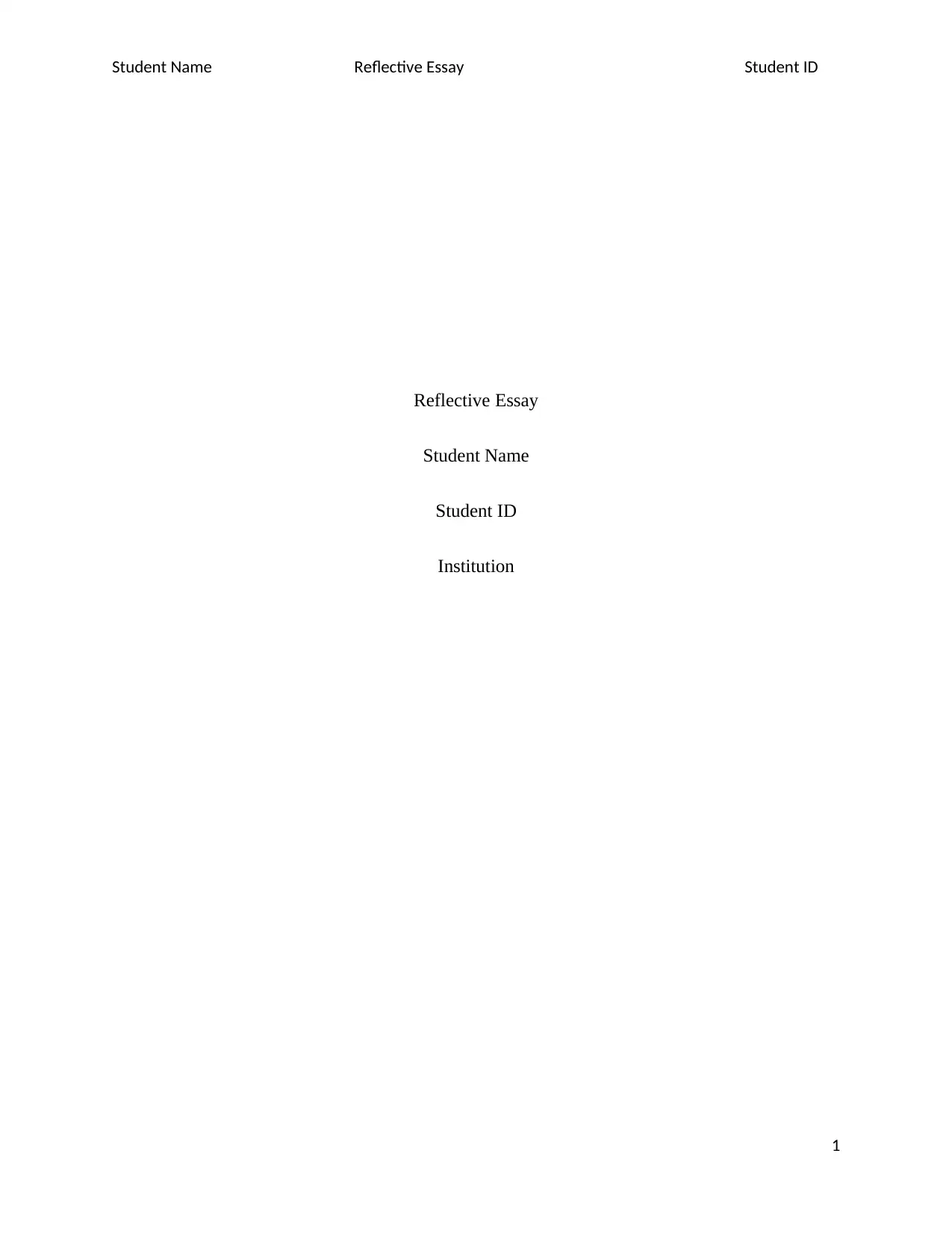
Student Name Reflective Essay Student ID
Reflective Essay
Student Name
Student ID
Institution
1
Reflective Essay
Student Name
Student ID
Institution
1
Paraphrase This Document
Need a fresh take? Get an instant paraphrase of this document with our AI Paraphraser
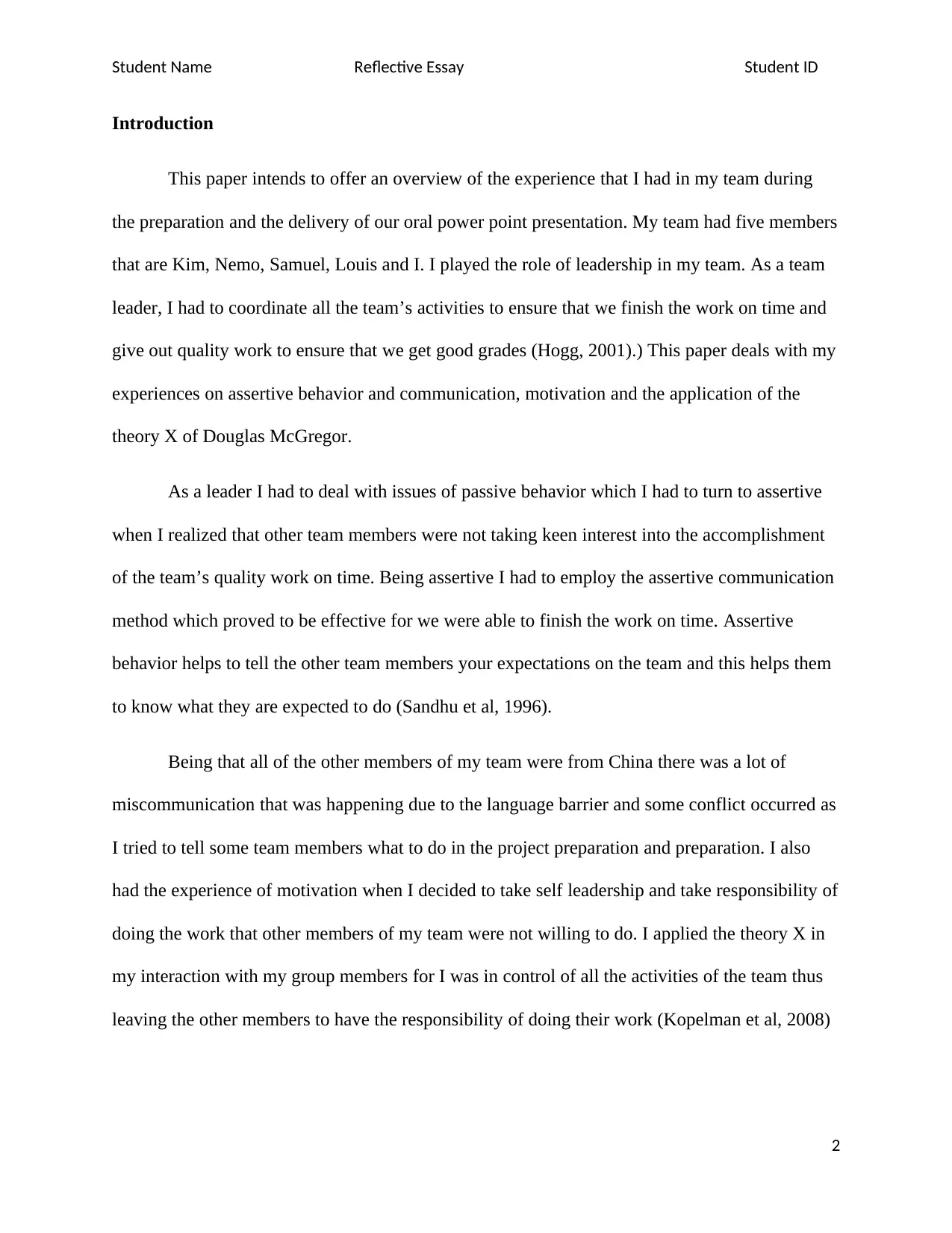
Student Name Reflective Essay Student ID
Introduction
This paper intends to offer an overview of the experience that I had in my team during
the preparation and the delivery of our oral power point presentation. My team had five members
that are Kim, Nemo, Samuel, Louis and I. I played the role of leadership in my team. As a team
leader, I had to coordinate all the team’s activities to ensure that we finish the work on time and
give out quality work to ensure that we get good grades (Hogg, 2001).) This paper deals with my
experiences on assertive behavior and communication, motivation and the application of the
theory X of Douglas McGregor.
As a leader I had to deal with issues of passive behavior which I had to turn to assertive
when I realized that other team members were not taking keen interest into the accomplishment
of the team’s quality work on time. Being assertive I had to employ the assertive communication
method which proved to be effective for we were able to finish the work on time. Assertive
behavior helps to tell the other team members your expectations on the team and this helps them
to know what they are expected to do (Sandhu et al, 1996).
Being that all of the other members of my team were from China there was a lot of
miscommunication that was happening due to the language barrier and some conflict occurred as
I tried to tell some team members what to do in the project preparation and preparation. I also
had the experience of motivation when I decided to take self leadership and take responsibility of
doing the work that other members of my team were not willing to do. I applied the theory X in
my interaction with my group members for I was in control of all the activities of the team thus
leaving the other members to have the responsibility of doing their work (Kopelman et al, 2008)
2
Introduction
This paper intends to offer an overview of the experience that I had in my team during
the preparation and the delivery of our oral power point presentation. My team had five members
that are Kim, Nemo, Samuel, Louis and I. I played the role of leadership in my team. As a team
leader, I had to coordinate all the team’s activities to ensure that we finish the work on time and
give out quality work to ensure that we get good grades (Hogg, 2001).) This paper deals with my
experiences on assertive behavior and communication, motivation and the application of the
theory X of Douglas McGregor.
As a leader I had to deal with issues of passive behavior which I had to turn to assertive
when I realized that other team members were not taking keen interest into the accomplishment
of the team’s quality work on time. Being assertive I had to employ the assertive communication
method which proved to be effective for we were able to finish the work on time. Assertive
behavior helps to tell the other team members your expectations on the team and this helps them
to know what they are expected to do (Sandhu et al, 1996).
Being that all of the other members of my team were from China there was a lot of
miscommunication that was happening due to the language barrier and some conflict occurred as
I tried to tell some team members what to do in the project preparation and preparation. I also
had the experience of motivation when I decided to take self leadership and take responsibility of
doing the work that other members of my team were not willing to do. I applied the theory X in
my interaction with my group members for I was in control of all the activities of the team thus
leaving the other members to have the responsibility of doing their work (Kopelman et al, 2008)
2
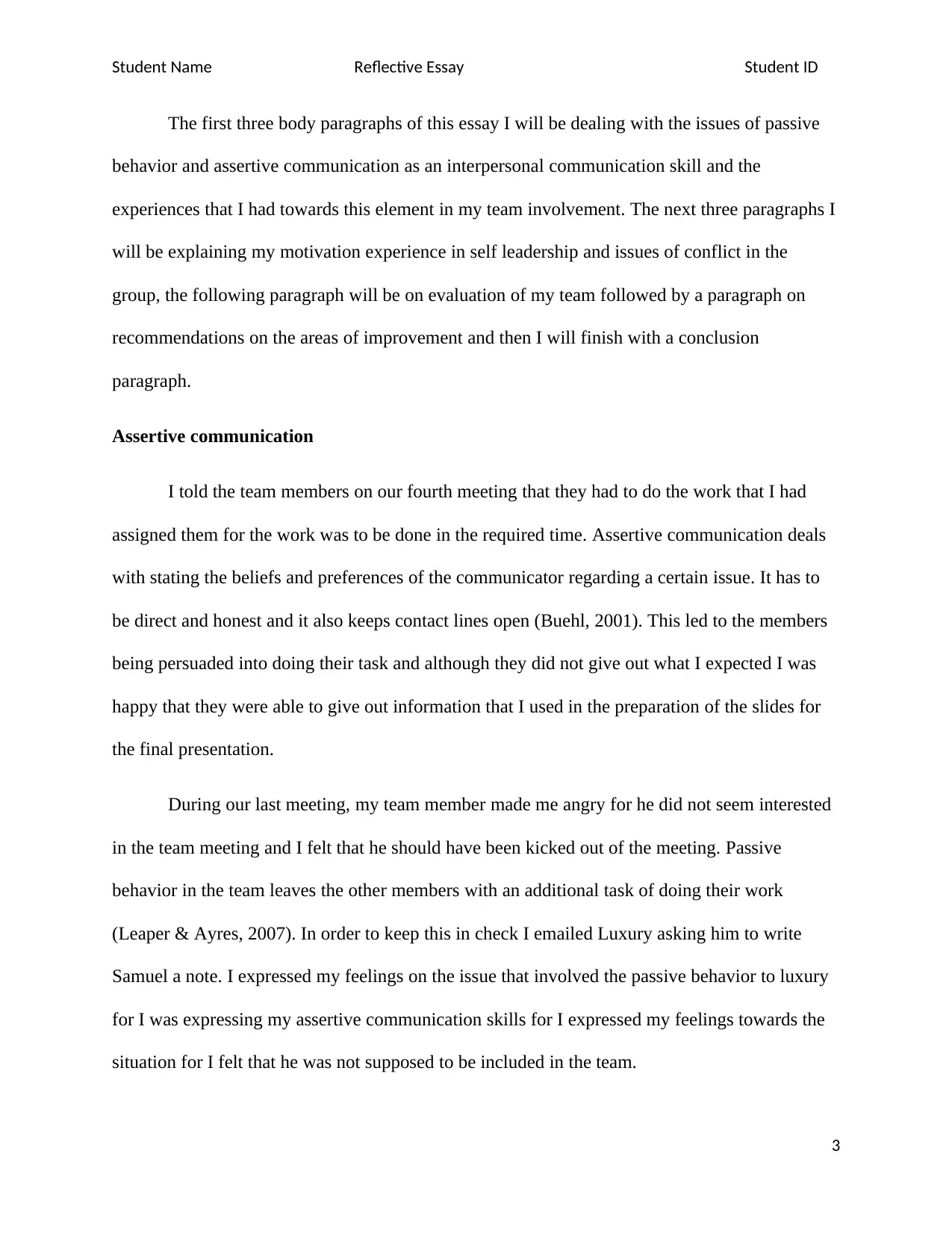
Student Name Reflective Essay Student ID
The first three body paragraphs of this essay I will be dealing with the issues of passive
behavior and assertive communication as an interpersonal communication skill and the
experiences that I had towards this element in my team involvement. The next three paragraphs I
will be explaining my motivation experience in self leadership and issues of conflict in the
group, the following paragraph will be on evaluation of my team followed by a paragraph on
recommendations on the areas of improvement and then I will finish with a conclusion
paragraph.
Assertive communication
I told the team members on our fourth meeting that they had to do the work that I had
assigned them for the work was to be done in the required time. Assertive communication deals
with stating the beliefs and preferences of the communicator regarding a certain issue. It has to
be direct and honest and it also keeps contact lines open (Buehl, 2001). This led to the members
being persuaded into doing their task and although they did not give out what I expected I was
happy that they were able to give out information that I used in the preparation of the slides for
the final presentation.
During our last meeting, my team member made me angry for he did not seem interested
in the team meeting and I felt that he should have been kicked out of the meeting. Passive
behavior in the team leaves the other members with an additional task of doing their work
(Leaper & Ayres, 2007). In order to keep this in check I emailed Luxury asking him to write
Samuel a note. I expressed my feelings on the issue that involved the passive behavior to luxury
for I was expressing my assertive communication skills for I expressed my feelings towards the
situation for I felt that he was not supposed to be included in the team.
3
The first three body paragraphs of this essay I will be dealing with the issues of passive
behavior and assertive communication as an interpersonal communication skill and the
experiences that I had towards this element in my team involvement. The next three paragraphs I
will be explaining my motivation experience in self leadership and issues of conflict in the
group, the following paragraph will be on evaluation of my team followed by a paragraph on
recommendations on the areas of improvement and then I will finish with a conclusion
paragraph.
Assertive communication
I told the team members on our fourth meeting that they had to do the work that I had
assigned them for the work was to be done in the required time. Assertive communication deals
with stating the beliefs and preferences of the communicator regarding a certain issue. It has to
be direct and honest and it also keeps contact lines open (Buehl, 2001). This led to the members
being persuaded into doing their task and although they did not give out what I expected I was
happy that they were able to give out information that I used in the preparation of the slides for
the final presentation.
During our last meeting, my team member made me angry for he did not seem interested
in the team meeting and I felt that he should have been kicked out of the meeting. Passive
behavior in the team leaves the other members with an additional task of doing their work
(Leaper & Ayres, 2007). In order to keep this in check I emailed Luxury asking him to write
Samuel a note. I expressed my feelings on the issue that involved the passive behavior to luxury
for I was expressing my assertive communication skills for I expressed my feelings towards the
situation for I felt that he was not supposed to be included in the team.
3
⊘ This is a preview!⊘
Do you want full access?
Subscribe today to unlock all pages.

Trusted by 1+ million students worldwide
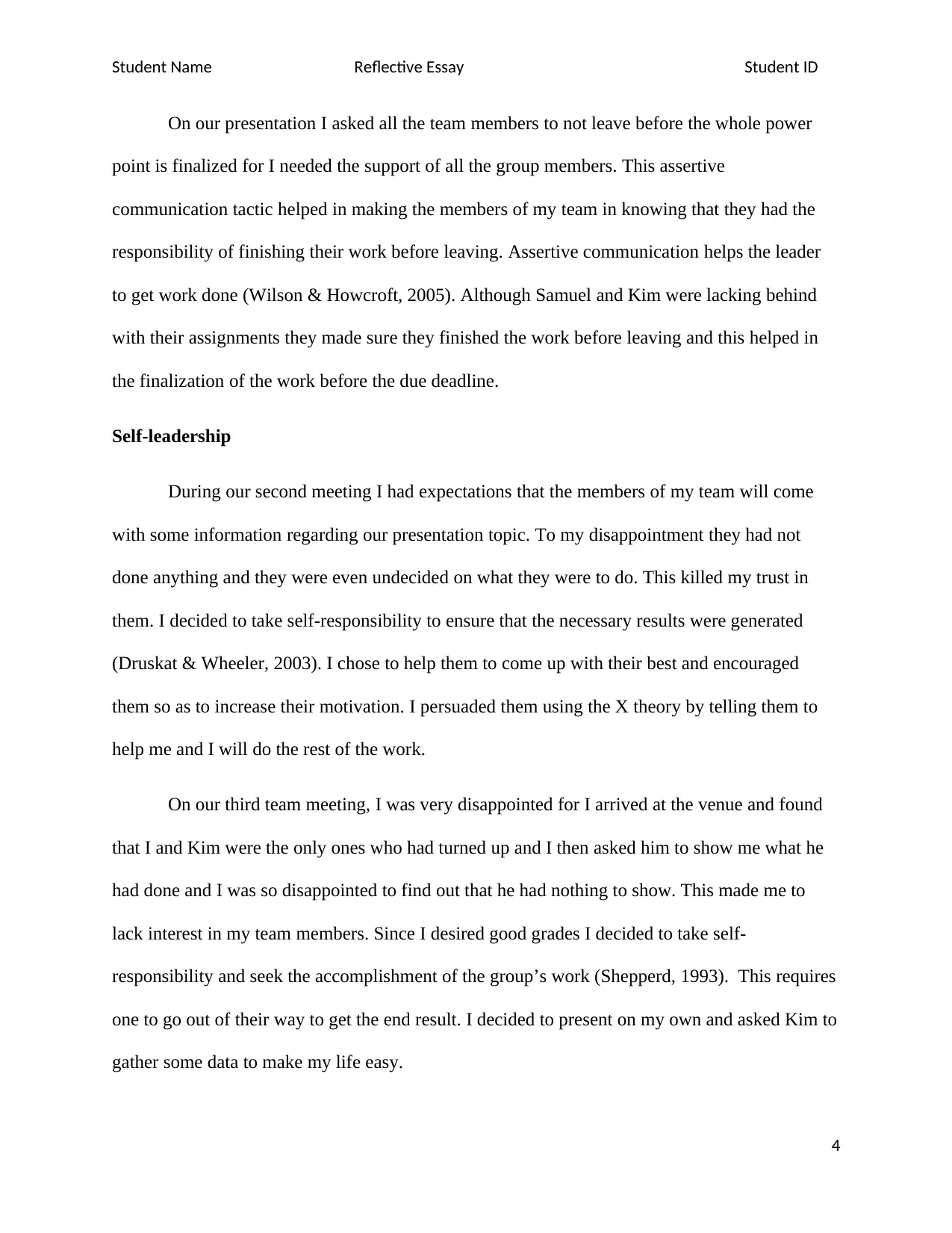
Student Name Reflective Essay Student ID
On our presentation I asked all the team members to not leave before the whole power
point is finalized for I needed the support of all the group members. This assertive
communication tactic helped in making the members of my team in knowing that they had the
responsibility of finishing their work before leaving. Assertive communication helps the leader
to get work done (Wilson & Howcroft, 2005). Although Samuel and Kim were lacking behind
with their assignments they made sure they finished the work before leaving and this helped in
the finalization of the work before the due deadline.
Self-leadership
During our second meeting I had expectations that the members of my team will come
with some information regarding our presentation topic. To my disappointment they had not
done anything and they were even undecided on what they were to do. This killed my trust in
them. I decided to take self-responsibility to ensure that the necessary results were generated
(Druskat & Wheeler, 2003). I chose to help them to come up with their best and encouraged
them so as to increase their motivation. I persuaded them using the X theory by telling them to
help me and I will do the rest of the work.
On our third team meeting, I was very disappointed for I arrived at the venue and found
that I and Kim were the only ones who had turned up and I then asked him to show me what he
had done and I was so disappointed to find out that he had nothing to show. This made me to
lack interest in my team members. Since I desired good grades I decided to take self-
responsibility and seek the accomplishment of the group’s work (Shepperd, 1993). This requires
one to go out of their way to get the end result. I decided to present on my own and asked Kim to
gather some data to make my life easy.
4
On our presentation I asked all the team members to not leave before the whole power
point is finalized for I needed the support of all the group members. This assertive
communication tactic helped in making the members of my team in knowing that they had the
responsibility of finishing their work before leaving. Assertive communication helps the leader
to get work done (Wilson & Howcroft, 2005). Although Samuel and Kim were lacking behind
with their assignments they made sure they finished the work before leaving and this helped in
the finalization of the work before the due deadline.
Self-leadership
During our second meeting I had expectations that the members of my team will come
with some information regarding our presentation topic. To my disappointment they had not
done anything and they were even undecided on what they were to do. This killed my trust in
them. I decided to take self-responsibility to ensure that the necessary results were generated
(Druskat & Wheeler, 2003). I chose to help them to come up with their best and encouraged
them so as to increase their motivation. I persuaded them using the X theory by telling them to
help me and I will do the rest of the work.
On our third team meeting, I was very disappointed for I arrived at the venue and found
that I and Kim were the only ones who had turned up and I then asked him to show me what he
had done and I was so disappointed to find out that he had nothing to show. This made me to
lack interest in my team members. Since I desired good grades I decided to take self-
responsibility and seek the accomplishment of the group’s work (Shepperd, 1993). This requires
one to go out of their way to get the end result. I decided to present on my own and asked Kim to
gather some data to make my life easy.
4
Paraphrase This Document
Need a fresh take? Get an instant paraphrase of this document with our AI Paraphraser
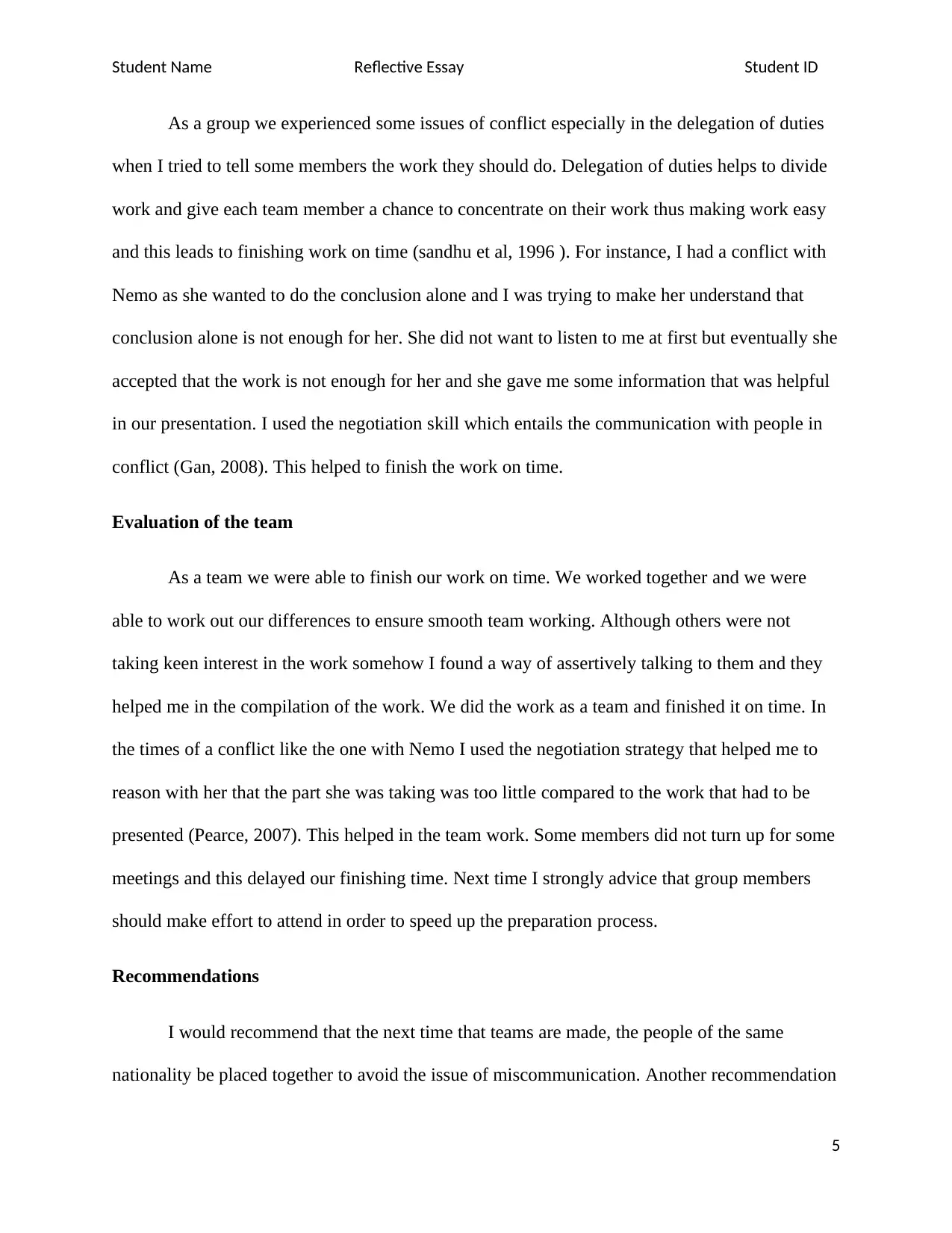
Student Name Reflective Essay Student ID
As a group we experienced some issues of conflict especially in the delegation of duties
when I tried to tell some members the work they should do. Delegation of duties helps to divide
work and give each team member a chance to concentrate on their work thus making work easy
and this leads to finishing work on time (sandhu et al, 1996 ). For instance, I had a conflict with
Nemo as she wanted to do the conclusion alone and I was trying to make her understand that
conclusion alone is not enough for her. She did not want to listen to me at first but eventually she
accepted that the work is not enough for her and she gave me some information that was helpful
in our presentation. I used the negotiation skill which entails the communication with people in
conflict (Gan, 2008). This helped to finish the work on time.
Evaluation of the team
As a team we were able to finish our work on time. We worked together and we were
able to work out our differences to ensure smooth team working. Although others were not
taking keen interest in the work somehow I found a way of assertively talking to them and they
helped me in the compilation of the work. We did the work as a team and finished it on time. In
the times of a conflict like the one with Nemo I used the negotiation strategy that helped me to
reason with her that the part she was taking was too little compared to the work that had to be
presented (Pearce, 2007). This helped in the team work. Some members did not turn up for some
meetings and this delayed our finishing time. Next time I strongly advice that group members
should make effort to attend in order to speed up the preparation process.
Recommendations
I would recommend that the next time that teams are made, the people of the same
nationality be placed together to avoid the issue of miscommunication. Another recommendation
5
As a group we experienced some issues of conflict especially in the delegation of duties
when I tried to tell some members the work they should do. Delegation of duties helps to divide
work and give each team member a chance to concentrate on their work thus making work easy
and this leads to finishing work on time (sandhu et al, 1996 ). For instance, I had a conflict with
Nemo as she wanted to do the conclusion alone and I was trying to make her understand that
conclusion alone is not enough for her. She did not want to listen to me at first but eventually she
accepted that the work is not enough for her and she gave me some information that was helpful
in our presentation. I used the negotiation skill which entails the communication with people in
conflict (Gan, 2008). This helped to finish the work on time.
Evaluation of the team
As a team we were able to finish our work on time. We worked together and we were
able to work out our differences to ensure smooth team working. Although others were not
taking keen interest in the work somehow I found a way of assertively talking to them and they
helped me in the compilation of the work. We did the work as a team and finished it on time. In
the times of a conflict like the one with Nemo I used the negotiation strategy that helped me to
reason with her that the part she was taking was too little compared to the work that had to be
presented (Pearce, 2007). This helped in the team work. Some members did not turn up for some
meetings and this delayed our finishing time. Next time I strongly advice that group members
should make effort to attend in order to speed up the preparation process.
Recommendations
I would recommend that the next time that teams are made, the people of the same
nationality be placed together to avoid the issue of miscommunication. Another recommendation
5
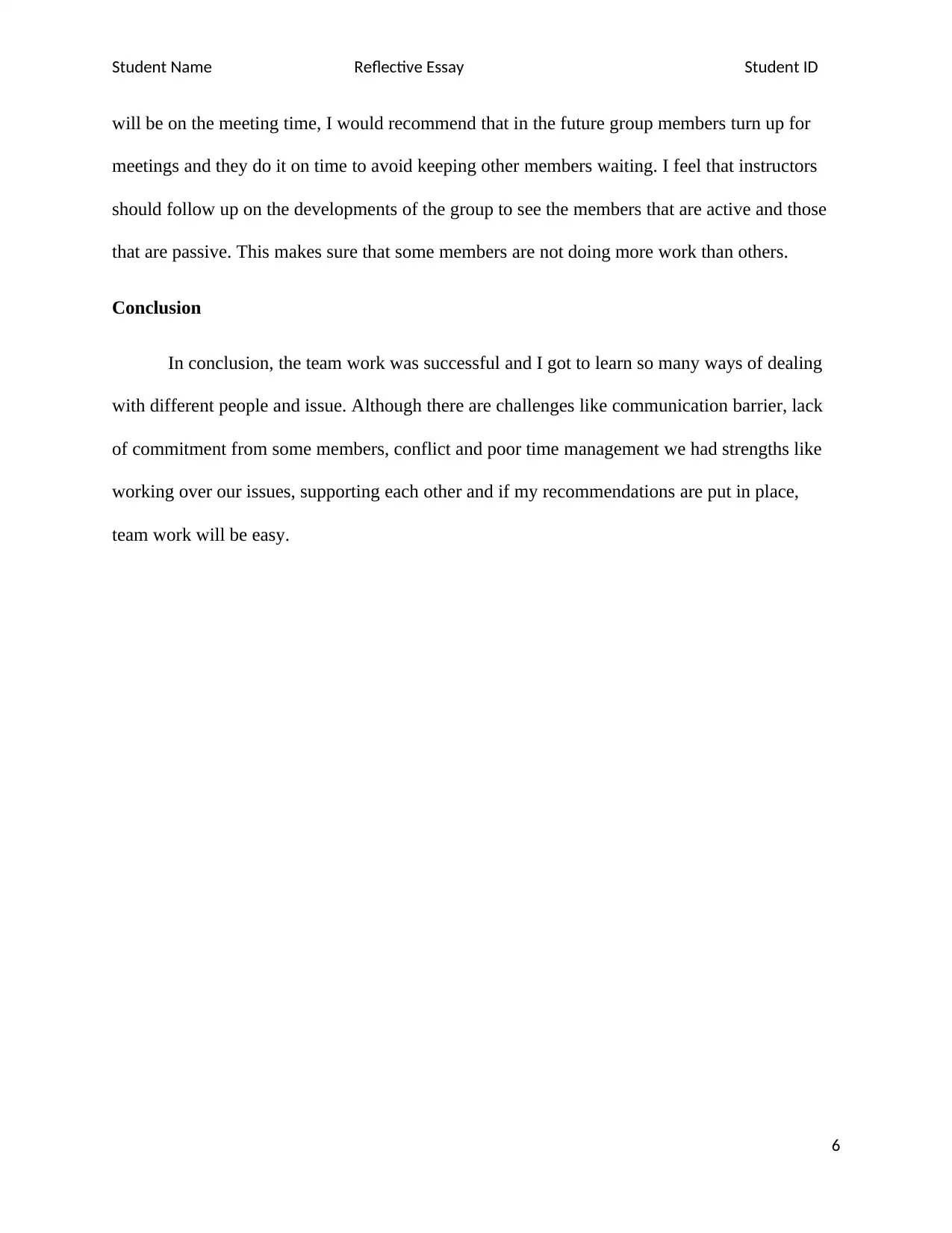
Student Name Reflective Essay Student ID
will be on the meeting time, I would recommend that in the future group members turn up for
meetings and they do it on time to avoid keeping other members waiting. I feel that instructors
should follow up on the developments of the group to see the members that are active and those
that are passive. This makes sure that some members are not doing more work than others.
Conclusion
In conclusion, the team work was successful and I got to learn so many ways of dealing
with different people and issue. Although there are challenges like communication barrier, lack
of commitment from some members, conflict and poor time management we had strengths like
working over our issues, supporting each other and if my recommendations are put in place,
team work will be easy.
6
will be on the meeting time, I would recommend that in the future group members turn up for
meetings and they do it on time to avoid keeping other members waiting. I feel that instructors
should follow up on the developments of the group to see the members that are active and those
that are passive. This makes sure that some members are not doing more work than others.
Conclusion
In conclusion, the team work was successful and I got to learn so many ways of dealing
with different people and issue. Although there are challenges like communication barrier, lack
of commitment from some members, conflict and poor time management we had strengths like
working over our issues, supporting each other and if my recommendations are put in place,
team work will be easy.
6
⊘ This is a preview!⊘
Do you want full access?
Subscribe today to unlock all pages.

Trusted by 1+ million students worldwide
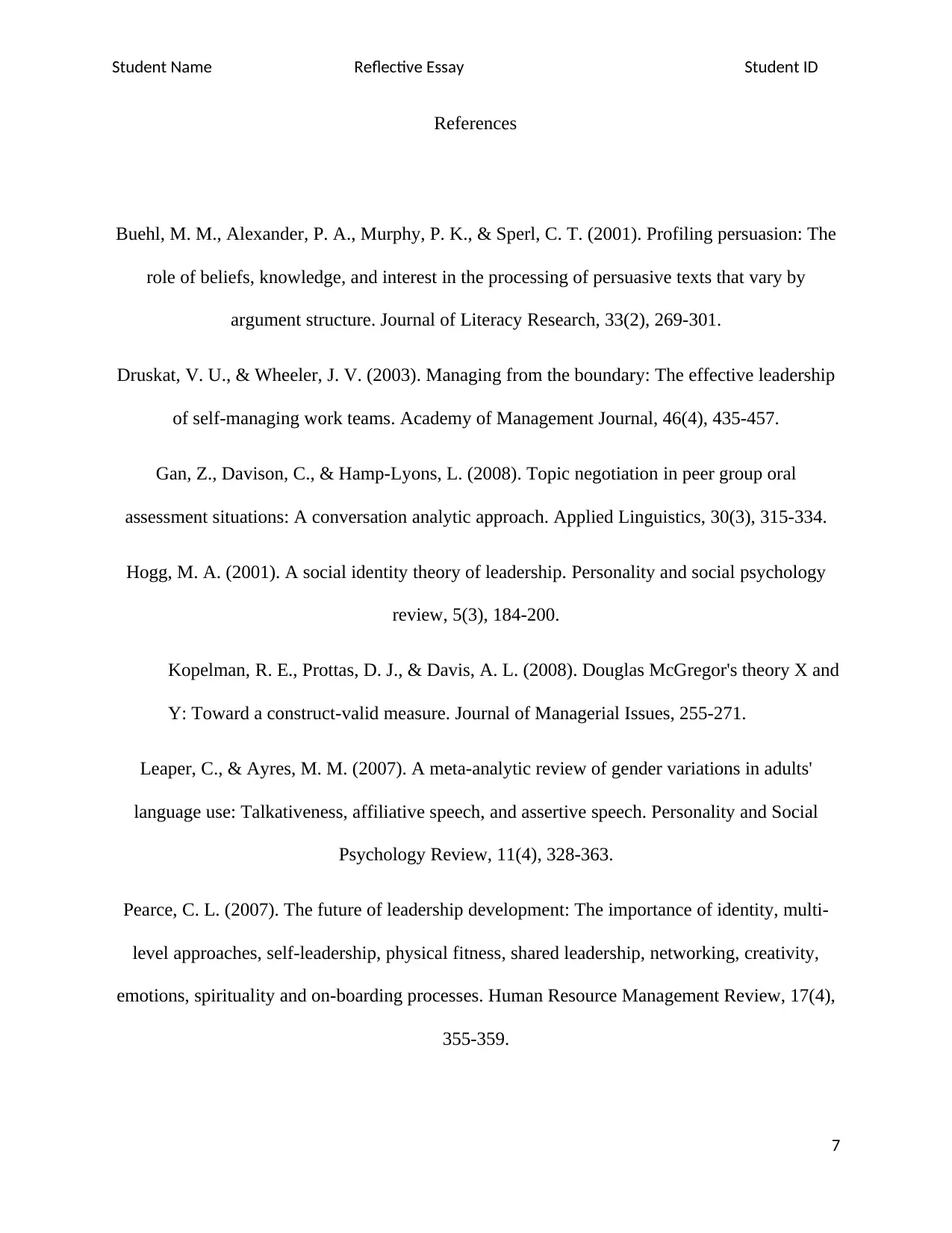
Student Name Reflective Essay Student ID
References
Buehl, M. M., Alexander, P. A., Murphy, P. K., & Sperl, C. T. (2001). Profiling persuasion: The
role of beliefs, knowledge, and interest in the processing of persuasive texts that vary by
argument structure. Journal of Literacy Research, 33(2), 269-301.
Druskat, V. U., & Wheeler, J. V. (2003). Managing from the boundary: The effective leadership
of self-managing work teams. Academy of Management Journal, 46(4), 435-457.
Gan, Z., Davison, C., & Hamp-Lyons, L. (2008). Topic negotiation in peer group oral
assessment situations: A conversation analytic approach. Applied Linguistics, 30(3), 315-334.
Hogg, M. A. (2001). A social identity theory of leadership. Personality and social psychology
review, 5(3), 184-200.
Kopelman, R. E., Prottas, D. J., & Davis, A. L. (2008). Douglas McGregor's theory X and
Y: Toward a construct-valid measure. Journal of Managerial Issues, 255-271.
Leaper, C., & Ayres, M. M. (2007). A meta-analytic review of gender variations in adults'
language use: Talkativeness, affiliative speech, and assertive speech. Personality and Social
Psychology Review, 11(4), 328-363.
Pearce, C. L. (2007). The future of leadership development: The importance of identity, multi-
level approaches, self-leadership, physical fitness, shared leadership, networking, creativity,
emotions, spirituality and on-boarding processes. Human Resource Management Review, 17(4),
355-359.
7
References
Buehl, M. M., Alexander, P. A., Murphy, P. K., & Sperl, C. T. (2001). Profiling persuasion: The
role of beliefs, knowledge, and interest in the processing of persuasive texts that vary by
argument structure. Journal of Literacy Research, 33(2), 269-301.
Druskat, V. U., & Wheeler, J. V. (2003). Managing from the boundary: The effective leadership
of self-managing work teams. Academy of Management Journal, 46(4), 435-457.
Gan, Z., Davison, C., & Hamp-Lyons, L. (2008). Topic negotiation in peer group oral
assessment situations: A conversation analytic approach. Applied Linguistics, 30(3), 315-334.
Hogg, M. A. (2001). A social identity theory of leadership. Personality and social psychology
review, 5(3), 184-200.
Kopelman, R. E., Prottas, D. J., & Davis, A. L. (2008). Douglas McGregor's theory X and
Y: Toward a construct-valid measure. Journal of Managerial Issues, 255-271.
Leaper, C., & Ayres, M. M. (2007). A meta-analytic review of gender variations in adults'
language use: Talkativeness, affiliative speech, and assertive speech. Personality and Social
Psychology Review, 11(4), 328-363.
Pearce, C. L. (2007). The future of leadership development: The importance of identity, multi-
level approaches, self-leadership, physical fitness, shared leadership, networking, creativity,
emotions, spirituality and on-boarding processes. Human Resource Management Review, 17(4),
355-359.
7
Paraphrase This Document
Need a fresh take? Get an instant paraphrase of this document with our AI Paraphraser
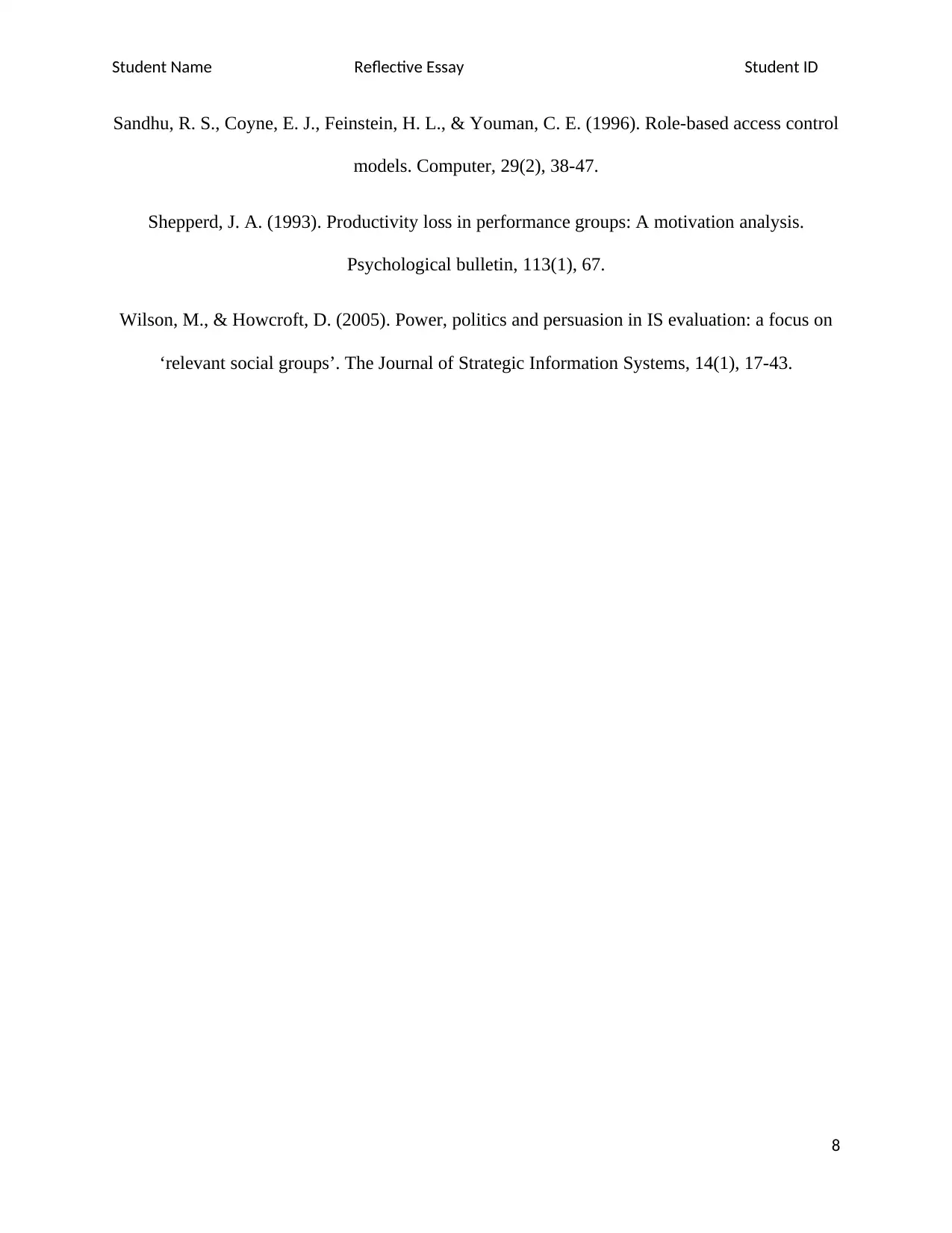
Student Name Reflective Essay Student ID
Sandhu, R. S., Coyne, E. J., Feinstein, H. L., & Youman, C. E. (1996). Role-based access control
models. Computer, 29(2), 38-47.
Shepperd, J. A. (1993). Productivity loss in performance groups: A motivation analysis.
Psychological bulletin, 113(1), 67.
Wilson, M., & Howcroft, D. (2005). Power, politics and persuasion in IS evaluation: a focus on
‘relevant social groups’. The Journal of Strategic Information Systems, 14(1), 17-43.
8
Sandhu, R. S., Coyne, E. J., Feinstein, H. L., & Youman, C. E. (1996). Role-based access control
models. Computer, 29(2), 38-47.
Shepperd, J. A. (1993). Productivity loss in performance groups: A motivation analysis.
Psychological bulletin, 113(1), 67.
Wilson, M., & Howcroft, D. (2005). Power, politics and persuasion in IS evaluation: a focus on
‘relevant social groups’. The Journal of Strategic Information Systems, 14(1), 17-43.
8
1 out of 8
Related Documents
Your All-in-One AI-Powered Toolkit for Academic Success.
+13062052269
info@desklib.com
Available 24*7 on WhatsApp / Email
![[object Object]](/_next/static/media/star-bottom.7253800d.svg)
Unlock your academic potential
Copyright © 2020–2026 A2Z Services. All Rights Reserved. Developed and managed by ZUCOL.





